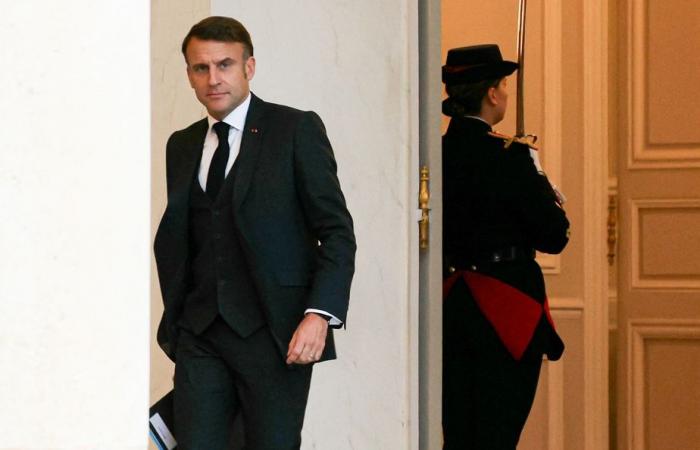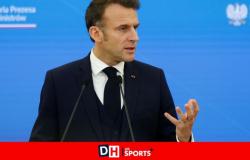(Paris) France is expected to have a new prime minister on Thursday, a week after a historic vote of no confidence in the National Assembly that toppled the center-right government and plunged the country into uncertainty.
Published at 1:28 p.m.
Francesco FONTEMAGGI
Agence France-Presse
The appointment of the new head of government is expected on Thursday, a source within the executive told AFP. President Emmanuel Macron is going to Poland, and the appointment will take place “rather upon his return” at the end of the day, this source said.
Tuesday, on the sidelines of a meeting at the Élysée with party leaders, the president committed to appointing a new head of government “within 48 hours”, according to his entourage.
The new prime minister should be responsible for negotiating at least an agreement to avoid further censorship and adopt a budget for 2025.
With a deficit this year which should exceed 6% of GDP, France displays the worst performance of the Twenty-Seven with the exception of Romania, very far from the 3% ceiling authorized by the EU.
“Financial debt is a reality that will impose itself on any government, whatever it may be,” warned the resigning Prime Minister Michel Barnier in the Council of Ministers on Wednesday, according to participants.
Mr. Macron, to everyone’s surprise, dissolved the Assembly in June, after his camp’s defeat in the European elections against the far right. But the early legislative elections resulted in an Assembly fragmented into three blocs (alliance of left, Macronists and right, extreme right) without an absolute majority.
« Non-censorship »
If the centrist leader and long-time ally of the head of state, François Bayrou, is still one of the favorites, he is not unanimous, contested in particular by part of the right.
PHOTO FRED TANNEAU, ARCHIVES AGENCE FRANCE-PRESSE
François Bayrou
If it is not François Bayrou, the names of the resigning ministers of Health, Catherine Vautrin, and of the Armed Forces, Sébastien Lecornu are still circulating in the presidential camp.
Once appointed, the new head of government will have to negotiate with the parties participation in the government, or their support for certain texts including the budget, or even, at a minimum, a “non-censorship” agreement. Only then will he put together his team.
Wednesday, in the Council of Ministers, where a draft “special law” on the budget was presented to avoid paralysis, Emmanuel Macron however noted that the “base” of parties which supported the resigning Prime Minister Michel Barnier – bringing together the camp presidential and the right – could not “as it stands” be expanded.
The day before, he had underlined “his desire not to dissolve” the National Assembly again by 2027. And had noted “a unanimity of political forces to no longer depend on the National Rally (extreme right)”.
The left is still demanding that one of its own be appointed to Matignon and has undertaken not to use article 49.3 of the Constitution to have laws adopted without a vote if, in exchange, the opponents undertake not to censor.
“A staggering commitment, a circumvention of the Constitution”, reacted the leader of the far right Marine Le Pen, “not unhappy” to be sidelined. At this stage, the French do not seem to hold it against her: an Ifop-Fiducial poll credits her with more than 35% of voting intentions in the first round of the presidential election.
“Worried”, “angry”, “tired”
On Wednesday, François Bayrou, president of MoDem (center right), seemed to retain his place among the favorites for the post of prime minister. “Yesterday, at the end of the meeting at the Élysée, François Bayrou was deliriously optimistic, he was fully pumped up,” notes a participant.
The fact remains that part of the right has a certain hostility towards him, with former president Nicolas Sarkozy in the lead.
The socialist Olivier Faure is also reluctant, believing that the mayor of Pau (South-West) would embody a “continuity” of Macronism. However, he remained evasive about his party’s attitude if Mr. Macron nominated the centrist.
For his part, the leader of the radical left has already launched a treason trial: “No coalition agreement! No “non-censorship”. Come back to your senses and home! », Launched the leader of the Insoumis on Tuesday evening.
“The more Jean-Luc Mélenchon shouts, the less we hear him,” replied Olivier Faure, accusing the Insoumis of “weakening the collective” through its “empty chair policy”.
This wait, a week after censorship, leaves the French worried (32%), “angry” (30%) and tired (24%), according to an Elabe survey for BFMTV published Wednesday. A large majority of them say they are in favor (69%) of a non-censorship agreement, but almost as many (67%) do not believe in the ability of the parties to agree.







